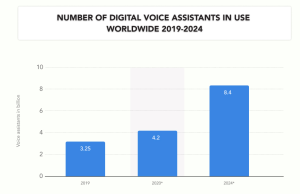Mastering Voice Search: A Copywriter’s Guide to Optimization
Have you ever thought about optimizing your copy for voice search and speech recognition? Voice search optimization can increase exposure and engagement by making your material more voice-search friendly.
These virtual assistants can respond to commands, provide us with information and assist users in the control of other electronics connected to main devices.
According to research conducted by Statista, the number of people using digital voice assistants is expected to double from 4.2 billion in 2020 to a predicted 8.4 billion units by the end of 2024.
Let’s take a look at how copywriters might modify their work to accommodate the latest developments in voice search:
Table of Contents
1. Use Natural Language
Traditional text-based searches (such as those conducted by Google, Bing, etc.) and voice search queries differ greatly. The length and conversational tone of the questions make the largest difference. When utilizing voice assistants, people prefer to speak more organically, which leads to longer, question-based searches. “Hey, Alexa, where’s the best pizza restaurant in Cleveland?” is a more likely response than typing “best pizza restaurant in Cleveland” into a text search. As though they were actual people, we converse with our voice assistants.
To modify your material for this change, concentrate on:
- Conversational Language: Write like you would like others to talk. Aim for a genuine, conversational tone and steer clear of more formal or SEO-driven wording.
- Long-Tail Keywords: Target lengthier, more focused keyword phrases that correspond to the way consumers formulate voice search inquiries by using long-tail keywords.
- Use “How,” “What,” “When,” and “Why”: Concentrate on providing direct answers to these kinds of frequently asked queries in your material. Think of it as your website’s FAQ area.
- Identify common questions: For some questions, your audience will use their voice assistance. You can better connect your content with voice search intent if you know what they are, the answers to those queries, and what your audience will do. Think about utilising resources like AnswerThePublic and Google’s People Also Ask. When searching for voice search questions related to your topic, keyword research tools are also a fantastic choice.
2. Pay Attention to Position Zero and Featured Snippets
This is an illustration of a Position Zero:
We all want to be at position zero, but how can you be the website that tells the world how to cook rice in the most simple way possible?
Optimize for featured snippets:
- Answer Questions Clearly: Ideally, the initial few phrases or paragraphs of your content should provide succinct responses to frequently asked topics.
- Use Structured Data Markup: To improve search engine comprehension of your information, incorporate schema markup into your website. Code known as schema markup makes it easier for search engines to understand the content on your website. This increases the likelihood that you will be included in snippets.
- Make something “Snippet-Worthy.” Content: To make your information easier to skim and increase the likelihood that it will be selected as a snippet, use bullet points, numbered lists, and brief paragraphs.
3. Local SEO is Essential
Common location-based voice searches include, “Where’s the nearest coffee shop?” and “Where’s the nearest professional copywriter in Chicago?” Your chances of being found through these kinds of queries are increased when you optimize for local SEO and improve user experience.
To improve local SEO:
- Add Keywords That Are Specific to a Location: When appropriate, include references to your location in headings, meta descriptions, and the actual content.
- Claim Your Google My Business Profile: To ensure that voice assistants can access your company’s information, make sure it is current and includes correct address information, hours, and services for local businesses.
- Use Local Phrases: Include terms that locals may use to describe your company or offerings.
- Encourage Customer Reviews: Positive evaluations increase credibility and increase the possibility that your company will be voice-recommended.
- Use Tech Support for Local SEO: A tech support team can assist copywriters by setting up and managing localization tools. Cleveland tech support team will keep an eye on your website to make sure all technical elements. Such as broken links and structured data are operating correctly, assisting you in keeping a high ranking in local voice searches.





